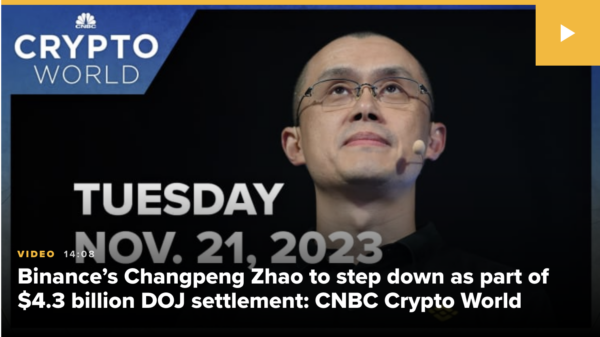
OMG…It Just Happened

In an unexpected turn of events that could have significant ramifications for the cryptocurrency industry, Changpeng Zhao, CEO of Binance, has reportedly agreed to plead guilty to specific federal charges. This development raises pressing questions about the future of Binance, one of the world’s largest cryptocurrency exchanges, and its possible trajectory following the downfall of competitor FTX.

According to recent reports, Zhao is prepared to admit to violations related to the Bank Secrecy Act, amidst allegations of Binance’s business dealings with Iran, defying U.S. sanctions. The plea, which implicates the company in a multi-year investigation by U.S. authorities, suggests potential compliance failures that could have broader implications for the digital asset sector.
Experts suggest Zhao could face a comparatively lenient sentence, potentially a few years reduced to probation, as part of a plea deal. This strategic move seems to be influenced by the severe consequences faced by FTX’s Sam Bankman-Fried, with Zhao likely seeking to minimize personal repercussions.
The charges against Binance and Zhao have sparked a debate over the integrity of the cryptocurrency industry, which has been marred by allegations of fraud and unethical practices during the recent crypto bubble. The guilty plea, accompanied by a substantial settlement of $4.3 billion and an additional $50 million personal fine for Zhao, marks a pivotal moment for regulatory oversight in the burgeoning field of digital finance.
While Zhao’s potential departure from Binance’s helm and the hefty fines may satiate regulatory scrutiny in the short term, they also open a Pandora’s box of concerns regarding the operational standards and ethical conduct within the industry. The Securities and Exchange Commission’s (SEC) Chair, Gary Gensler, has condemned Binance and Zhao for a “web of deception,” signaling a no-tolerance stance towards regulatory evasion and conflicts of interest.
Today, I stepped down as CEO of Binance. Admittedly, it was not easy to let go emotionally. But I know it is the right thing to do. I made mistakes, and I must take responsibility. This is best for our community, for Binance, and for myself.
Binance is no longer a baby. It is…
— CZ 🔶 BNB (@cz_binance) November 21, 2023
This case could serve as a bellwether for other crypto entities, prompting introspection about business models that may have hitherto operated on the fringes of legal and ethical boundaries. The repercussions for industry players like Coinbase and the overall cryptocurrency market remain to be seen, particularly as retail investor sentiment shifts from high-risk speculation to a more cautious ‘T-Bill and chill’ approach.
As the industry grapples with the implications of Zhao’s plea, the broader narrative unfolds against a backdrop of rising skepticism among investors, many of whom have become wary of the volatility and regulatory ambiguity that characterize the crypto markets.
In conclusion, Zhao’s plea agreement could be a watershed moment for the cryptocurrency industry, heralding a new era of accountability and regulatory compliance. As the industry matures, the need for transparent and ethical practices becomes increasingly paramount, not just for the sustainability of individual firms but for the credibility and stability of the entire digital asset ecosystem.
